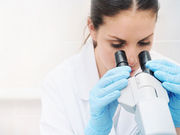Those at academic medical centers, higher-volume practices more likely to use molecular testing
MONDAY, Feb. 26, 2018 (HealthDay News) — Among dermatopathologists, relevant instruction during residency training, primary board certification in pathology, and academic medical center affiliation are among the factors associated with more frequent utilization of molecular testing, according to a study published online Feb. 13 in the Journal of Cutaneous Pathology.
Kristin Torre, from the University of Connecticut in Farmington, and colleagues surveyed 136 dermatopathologists to learn how they are employing molecular testing for neoplastic skin diseases and to assess their opinions of the broader role and utility of molecular technologies in clinical practice. The 15-question survey was sent to fellows of the American Society of Dermatopathology.
The researchers found that the vast majority of respondents (94 percent) reported experience with at least one molecular testing strategy. Nearly two in three dermatopathologists (62 percent) order ≥12 molecular tests per year, while 5 percent report ordering two or fewer assays per year. Factors associated with more frequent utilization of molecular testing include relevant instruction during residency training, primary board certification in pathology, academic medical center affiliation, higher-volume clinical practice, presence of on-site clinical molecular pathology/cytogenetics laboratory, and greater physician confidence incorporating test results into histopathological assessments.
“Wider adoption of molecular testing in dermatopathology may be limited by factors such as physician training, test costs/insurance coverage, logistical issues, and lack of evidence-based clinical practice guidelines,” the authors write.
Copyright © 2018 HealthDay. All rights reserved.








